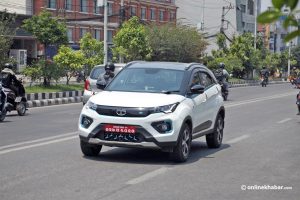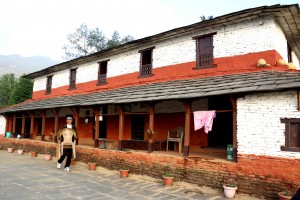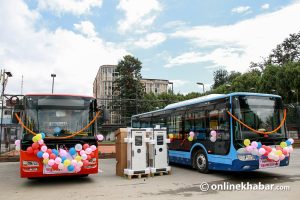
The government’s different explanation about import taxation for the electric vehicle import has stranded several such vehicles at the Nepal-China border.
NEV Nepal, which imported 72 electric microbuses from China, has had to keep the vehicles at the Nepal-China border in Tatopani due to tax disputes based on seats.
NEV Nepal Pvt Ltd, a sister company of Thee Go Pvt Ltd, has already imported more than 100 such electric microbuses from China’s DFS motor to Nepal. Due to their cheap and low operating costs, these buses have started to replace other diesel buses on the BP Highway. The number of such microbuses is increasing on various routes including Kathmandu-Pokhara.
But now, the company has decided not to bring these buses as the government wants to impose taxes stating these busses have nine seats and not 11 as it did during the previous electric vehicle imports, adding the government is being dishonest.
The seat dispute

Including two foldable seats, these microbuses have 11 seats. The company has been paying taxes stating these buses have 11 seats. But, the Tatopani Customs Office has said these buses have nine seats and want to tax them based on that. The customs office states it has not counted folding seats as regular ones.
According to the office, it charges an 11 per cent tax on vehicles with fewer than 10 seats and 1 per cent on those with more than 10 seats. The head of the Tatopani Customs Office, Dayananda KC, says that the tax is determined according to the provisions of the Finance Act.
According to him, after the importer claimed that the microbus has 11 seats, the Department of Transport Management was also asked for its opinion about the issue the electric vehicle import was facing. The Transport Department sent a reply that these buses had 11 seats.
However, looking at the provisions of the Finance Act, the customs office decided to collect the customs, stating these buses have nine seats. According to KC, it has been mentioned in the Finance Act that extra seats including folding seats are not counted as regular seats and the tax has been determined accordingly.
“Conductor seats and other additional seats and folding seats will not be counted’,” states the act.
But the CEO of Thee Go, Rajan Rayamajhi, complains that the customs office passed these buses stating they had 11 seats in the past and now the government is interpreting the law differently.
“Until now, the folding seats of all the company’s vehicles were counted as regular. But now our vehicles are being taxed differently. We do not think its fair,” says Rayamajhi, adding this will not favour the government’s plan of pushing electric vehicle import in the future.
He says its tax liability will go up by Rs 25 million if the government goes ahead with its plan and taxes the company stating the buses are nine-seaters.
“This will disrupt the EV market that is making strides in the country,” he says.
According to Rayamajhi, if the 11-seater busses are considered nine-seaters, the buses’ road improvement fee will also go up by paid 2.5 per cent.
Duty or deception?

According to Rayamajhi, over the past few years, the customs department had been counting folding seats as regulars on all occasions of electric vehicle import, arguing the new fleet should also be treated equally.
Rayamajhi says that it is sad that there is a different interpretation of this arrangement only for Thee Go now, saying that he is ready to bear everything because all the revenue that was exempted in the past has been recovered.
He says the different interpretation of the rules is being implemented only for electric vehicle imports, which he feels was raising suspicion. When he tried to get answers as to why it has happened, high-ranking officials at the customs department refused to answer him.
Although the Tatopani customs stopped the electric vehicle import citing the seat dispute, the Rasuwagadhi customs is letting the same type of vehicles enter taxing them only 1 per cent. But KC says it has written to the customs department to ask all border points to levy the same tax.
“I don’t know why, in the past, folding seats were counted, but now we have stopped doing that. Our laws clearly state not to count folding seats,” says KC.
Electric vehicle importers feel this is a ploy by diesel bus owners who feel threatened by the rise of EVs buses in the country.
“The price of diesel vehicles of the same nature is Rs 4.8 million whereas the price of an electric bus is Rs 4.4 million. With zero fuel cost, people were benefiting a lot,” says an official from the Federation of Nepalese National Transport Entrepreneurs. “After the electric bus destroyed the diesel bus market, the interest groups are now trying to take away the benefits they have been getting from this law in the past.”
If folding seats are not considered regular seats, it will create problems in the next electric vehicle imports that include big buses as well, he says.
This story was translated from the original Nepali version and edited for clarity and length.
























